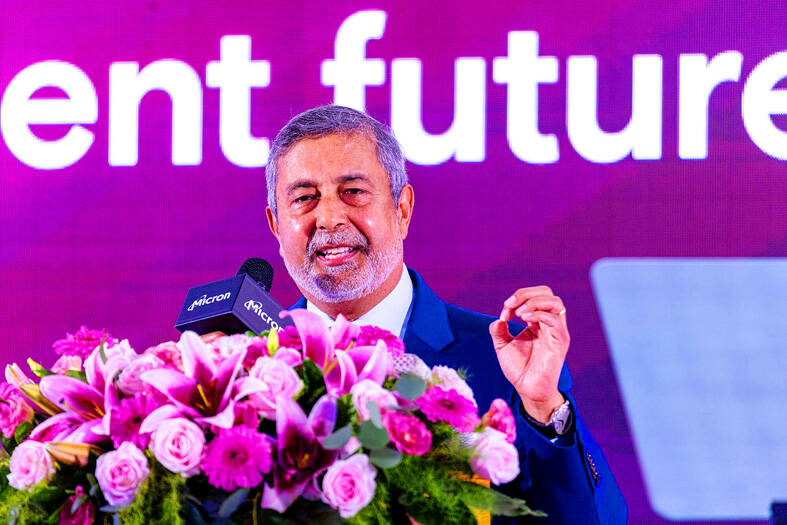Micron Technology Inc, the world’s third-largest memorychip maker, yesterday launched a new advanced chip assembly and testing plant in Taichung, paving the way for volume production of its high-bandwidth-memory HBM3E chips early next year to satisfy growing demand for artificial intelligence (AI) devices.
The Boise, Idaho-based company said the new facility, dubbed Advanced Assembly and Test Taiwan (AATT), integrates advanced probe, 3D packaging and testing capabilities to enable production of HBM3E and other products used in AI devices, data centers, and edge computing and cloud applications.
The new facility currently assembles and tests Micron’s one-beta DRAM manufactured at its Japanese fab in Hiroshima, the company said.

Photo: Bloomberg
Micron said it is seeing strong interest and enthusiasm for the HBM3E chips, which enable faster AI algorithms by providing “higher memory capacity that improves performance and reduces CPU offload for faster training and more responsive queries.”
AI applications provide a tremendous opportunity for new efficiency and transformation experiences, Micron Technology president and CEO Sanjay Mehrotra said at the opening ceremony for the AATT facility in Taichung. The company has unveiled products that unleash the power of AI from cloud to edge applications, he said.
Taiwan is the only manufacturing location that has vertical integration — from silicon manufacturing, assembly and testing to logistics — across Micron’s facilities, the company said.
“The opening of our new Advanced Assembly and Test facility is a reflection of Micron’s technology leadership, operational excellence and deep, long-term commitment to meeting the needs of our global customer base,” Mehrotra said.
“We are dedicated to Taiwan’s growth, and our investment in local operations will create hundreds of new Micron jobs, and thousands more for the surrounding community over the next ten years, allowing us to help create a lasting positive social impact,” he said.
Micron also operates assembly and test facilities in China, Malaysia and Singapore, the company said.
The opening of the new facility proves that Micron has recognized Taiwan as a reliable and secure investment destination, President Tsai Ing-wen (蔡英文) said at the opening ceremony yesterday.
Working with reliable partners and securing a resilient supply chain are now more important than ever, as no country and no industry can avoid the impacts of the COVID-19 pandemic and Russia’s invasion of Ukraine, Tsai said.
Micron yesterday also reiterated that it is on schedule to ramp up production of its next-generation one-gamma chips, which would enter volume production in the first half of 2025 at its A3 fab in Taichung. Micron Taiwan installed extreme ultraviolet lithography (EUV) tools, a key equipment to manufacture one-gamma chips, last year, before Micron Japan did so.
The company will explore the feasibility of arranging new job recruitments when its factories return to full utilization, said Donghui Lu (盧東暉), corporate vice president of front-end manufacturing and head of Micron Taiwan. Micron has suspended global headcount cuts, he said.
Micron said last week that prices of memory chips have bottomed and are expected to rebound next year.

Shares in Taiwan closed at a new high yesterday, the first trading day of the new year, as contract chipmaker Taiwan Semiconductor Manufacturing Co (TSMC, 台積電) continued to break records amid an artificial intelligence (AI) boom, dealers said. The TAIEX closed up 386.21 points, or 1.33 percent, at 29,349.81, with turnover totaling NT$648.844 billion (US$20.65 billion). “Judging from a stronger Taiwan dollar against the US dollar, I think foreign institutional investors returned from the holidays and brought funds into the local market,” Concord Securities Co (康和證券) analyst Kerry Huang (黃志祺) said. “Foreign investors just rebuilt their positions with TSMC as their top target,

REVENUE PERFORMANCE: Cloud and network products, and electronic components saw strong increases, while smart consumer electronics and computing products fell Hon Hai Precision Industry Co (鴻海精密) yesterday posted 26.51 percent quarterly growth in revenue for last quarter to NT$2.6 trillion (US$82.44 billion), the strongest on record for the period and above expectations, but the company forecast a slight revenue dip this quarter due to seasonal factors. On an annual basis, revenue last quarter grew 22.07 percent, the company said. Analysts on average estimated about NT$2.4 trillion increase. Hon Hai, which assembles servers for Nvidia Corp and iPhones for Apple Inc, is expanding its capacity in the US, adding artificial intelligence (AI) server production in Wisconsin and Texas, where it operates established campuses. This

US President Donald Trump on Friday blocked US photonics firm HieFo Corp’s US$3 million acquisition of assets in New Jersey-based aerospace and defense specialist Emcore Corp, citing national security and China-related concerns. In an order released by the White House, Trump said HieFo was “controlled by a citizen of the People’s Republic of China” and that its 2024 acquisition of Emcore’s businesses led the US president to believe that it might “take action that threatens to impair the national security of the United States.” The order did not name the person or detail Trump’s concerns. “The Transaction is hereby prohibited,”

Garment maker Makalot Industrial Co (聚陽) yesterday reported lower-than-expected fourth-quarter revenue of NT$7.93 billion (US$251.44 million), down 9.48 percent from NT$8.76 billion a year earlier. On a quarterly basis, revenue fell 10.83 percent from NT$8.89 billion, company data showed. The figure was also lower than market expectations of NT$8.05 billion, according to data compiled by Yuanta Securities Investment and Consulting Co (元大投顧), which had projected NT$8.22 billion. Makalot’s revenue this quarter would likely increase by a mid-teens percentage as the industry is entering its high season, Yuanta said. Overall, Makalot’s revenue last year totaled NT$34.43 billion, down 3.08 percent from its record NT$35.52